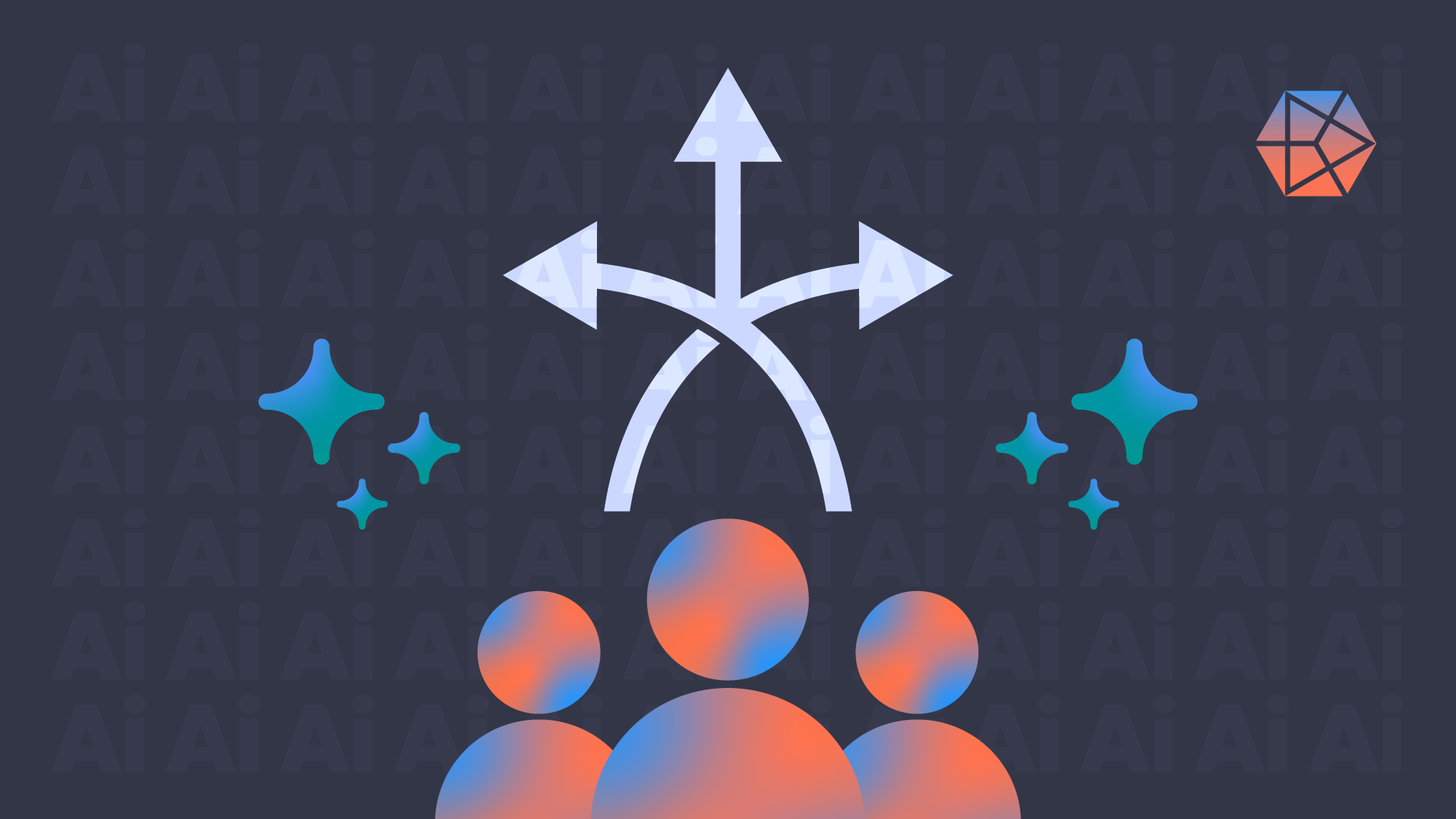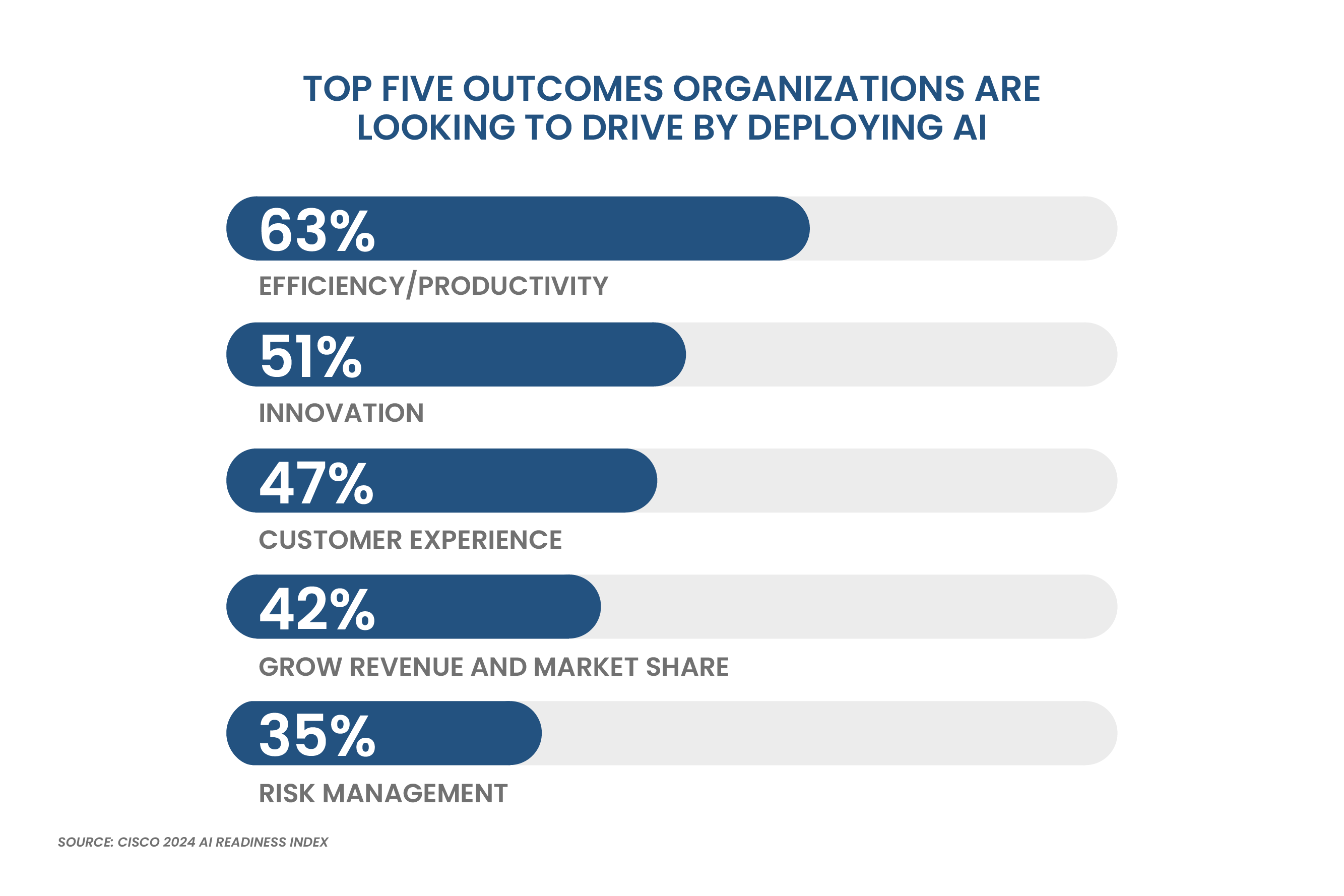
If you’re under pressure to implement AI in your organization, you’re likely also feeling the challenge of finding skilled AI talent to join your team. The AI talent shortage is the biggest hurdle for companies looking to take advantage of artificial intelligence.
The demand for AI talent isn’t slowing down. Many tech leaders are questioning their ability to build an AI development team soon enough. According to Cisco’s 2024 AI Readiness Index, 61% of enterprises anticipate that they have a year or less to implement their AI strategy before falling behind and facing significant negative business impacts. Nearly half (45%) highlight the AI talent shortage as a main challenge to improving their readiness to adopt AI and 24% believe there isn’t enough talent available to address the growing demand for AI in their sector.
However, many companies are approaching the demand for AI talent wrong. The focus shouldn’t be on finding highly specialized AI data engineers, data scientists, AI architects, AI infrastructure engineers, and cloud AI specialists.
While implementing AI does require specialized knowledge, companies need to start their search with flexible AI talent. Finding well-rounded AI experts who can continuously adapt to new innovations and your company’s evolving needs is the key to implementing AI without a large in-house team.
The Importance of Flexibility in AI Talent
In 2024, Moderna announced a partnership with OpenAI. Moderna’s AI integration spans over 750 unique business functions and a wide range of applications. It would be impossible to hire an expert in each of these functions. Instead, flexible AI talent allows Moderna to apply AI to processes across the entire organization. On average, Moderna employees now use ChatGPT at least 120 times per week.

The applications of AI are endless. If your organization is trying to increase productivity, improve customer experience, and grow revenue, you need AI talent that can wear many different hats and learn many different AI tools and business functions.
Even if you have a clear direction and a single use case right now, AI technology is evolving too rapidly to know if that experience set will be relevant six months or a year from now. Flexible AI talent is crucial because it enables companies to choose and adapt the best tools from a rapidly changing market.
With this constant change, future-proofing and upskilling should be top priorities to navigate the AI talent shortage. Rather than hiring specialists, you should look for talent with a solid foundation in AI technology and principles. From there, you can develop continuous learning and upskilling initiatives that can be easily tailored to the current advances and demands of AI.
Flexibility also relates to the AI solutions you use and the industries your engineers are experienced in. Choosing talent with broad experiences ensures you can evaluate a wide spectrum of solutions rather than being locked into a single vendor or technology stack.
Do You Need AI Talent?
Benefits of Working with External, Adaptable AI Teams
Cisco’s study also found that companies are increasingly turning to external teams to address the AI talent shortage, with 56% of organizations using contractors to plug AI talent gaps.
AI software development outsourcing gives you access to a wider pool of AI Infrastructure Engineers, Machine Learning Engineers, Cloud AI Specialists, Data Engineers, Data Scientists, AI Architects, MLOps Engineers, AI QA Engineers, AI Model Validation Engineers, and more, giving your organization the flexibility it needs to approach any AI implementation. The benefits of working with external, adaptable AI teams include:
- Avoid Vendor Lock-in: Assembling or outsourcing to a team experienced with all AI tools allows you to choose the right models and solutions for your needs instead of being locked into a specific AI Cloud Stack.
- Training and Upskilling: Even non-technical employees will need to be trained and upskilled to prepare your organization for a more AI-driven future and to answer the AI talent shortage. Half (51%) of organizations use external vendors to train their staff on AI tools and coordinate change management.
- Hybrid Team Structure: Looking for generalist hires and managing AI-powered distributed teams are two of the biggest trends for staff augmentation in 2025. Augmenting your more generalized, flexible talent with a larger pool of outsourced talent creates a more adaptable hybrid team structure.
- Global Talent Pool: One of the key ways organizations are navigating the AI talent shortage is to look outside their geographic area. Opening up to a global talent pool presents more opportunities to find the right skills for your needs.
- Scalability: Organizations are being tasked with rapidly scaling their AI capabilities in 2025 even with an AI talent shortage. Outsourcing allows you to rapidly scale your AI development teams in weeks instead of the months or years it takes to build an effective in-house team.
- Reduce Risk: A few years ago, tech companies rapidly scaled up their teams, only to be forced to undergo massive layoffs when the economy turned. Outsourcing helps reduce the risk of overextending yourself in any direction.
It’s difficult to predict what AI technology and adoption will look like in 5 years. The World Economic Forum’s Future of Jobs Report 2025 predicts that AI will eliminate 92 million jobs and create 170 million new jobs by 2030. This suggests the AI talent shortage isn’t going anywhere.
Organizations will need to work hard to access available AI talent, develop their existing employees, and attract emerging talent. Unfortunately, you don’t have 5 years to do it. Companies that fail to adopt AI in 2025 will quickly fall behind.
Outsourcing AI development and prioritizing flexible talent can help bridge the talent gap in the short term and keep your organization competitive. With our global talent pool, Gigster can provide access to AI expertise quickly and efficiently. Our flexible engagement models include fully-managed services, dedicated teams, and staff augmentation.
If you’re looking to overcome the AI talent shortage and complement your in-house AI team with a global perspective and cross-industry experience, hire Gigster today.
